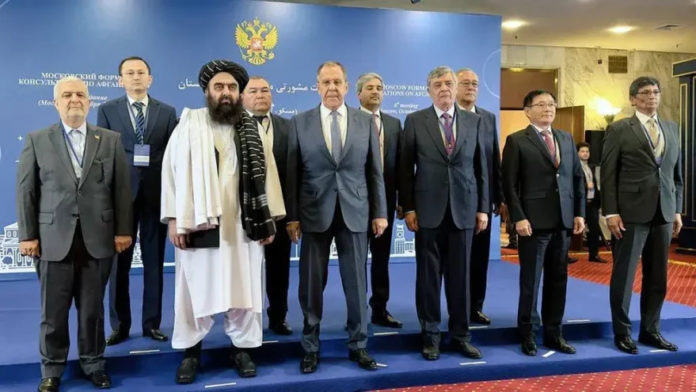The conference of regional countries hosted by Russia – also called the Moscow Format – explicitly “expressed deep concern” over the threat of terrorism that stakeholders said is rooted in Afghanistan.
It was the 6th meeting of the Moscow Format Consultations on Afghanistan held in Moscow and attended by special representatives and
senior officials of China, India, Iran, Kazakhstan, Kyrgyzstan, Pakistan, Russia, Tajikistan and Uzbekistan.
The Afghan delegation, headed by Amir Muttaqi, the Acting Foreign Minister of Afghanistan, also participated in the meeting.
In a joint statement issued after the moot, the parties expressed deep concern over the security situation related to terrorism in Afghanistan, noting that all terrorist and separatist groups, based in Afghanistan, continue to pose a serious threat to global and regional security.
The parties called for strengthening counter-terrorism cooperation at both bilateral and multilateral levels. Afghanistan should be supported in taking comprehensive measures to address both the symptoms and root causes of terrorism and to eradicate terrorism at an early date.
They called on de facto authorities to take visible and verifiable actions in fulfilling the international obligations and commitments made by Afghanistan to fight terrorism, dismantle, and eliminate all terrorist groups equally and non-discriminatory and prevent the use of Afghan territory against its neighbors, the region, and beyond.
The parties reaffirmed their unwavering support for Afghanistan as an independent, united and peaceful state. They called unacceptable the attempts by third countries to deploy their military infrastructure in Afghanistan and neighboring states since this does not serve the interests of regional peace and stability.
The parties noted the promising development of economic and trade exchanges and investment cooperation of Afghanistan with regional countries. 2
Expressed interest in developing regional economic projects with Afghan participation, and promoting steady progress in such fields as medical care, poverty alleviation, agriculture, and disaster prevention, so as to help Afghanistan realize independent and sustainable development at an early date. They supported the active integration of Afghanistan into regional connectivity.
The parties reiterated their commitment to continue humanitarian support to the Afghan people and called on the international community to intensify the provision of emergency humanitarian assistance to the Afghan people, while simultaneously reaffirming opposition to attempts to politicize it.
The parties had expectations for moderate, prudent and inclusive governance of the de facto authorities of Afghanistan to protect the basic rights and interests of all Afghan people, including women, girls and all ethnic groups, and continue working to meet Afghan people’s interests.
The parties called upon the current Afghan authorities to provide the necessary conditions to improve the welfare of the Afghan people, prevent their further migration and provide conditions for the return of the refugees. They also expressed appreciation for Iran, Pakistan and some other regional countries for hosting millions of Afghan refugees and urged the international community and donors to provide assistance.
The parties underlined the significant role of regional frameworks.
The parties urged the countries mainly responsible for the current predicament in Afghanistan to earnestly fulfill commitments to the economic recovery and future development of Afghanistan.




